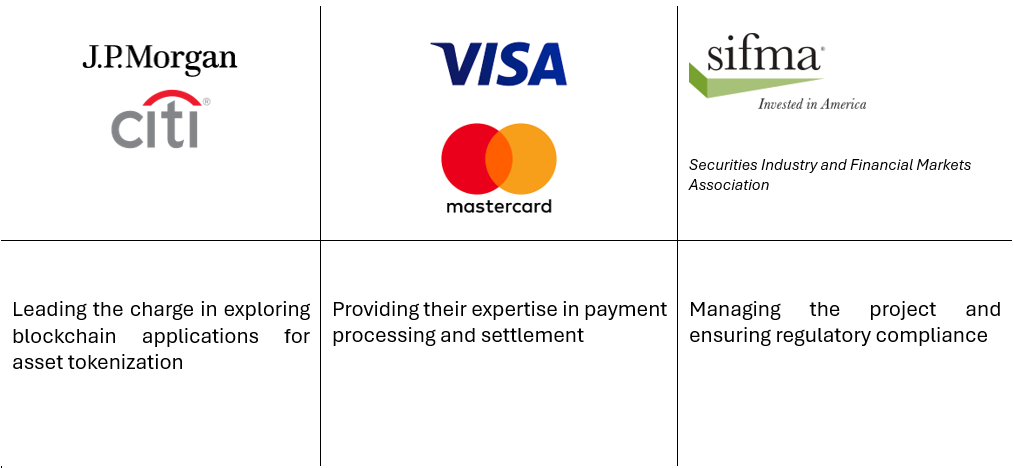Leading financial institutions such as JPMorgan, Citi, Visa, and Mastercard recently announced their collaboration on a project using shared ledger technology. The industry is buzzing over the high-profile trial, known as the Regulated Settlement Network (RSN). It will explore the potential of asset tokenization on the blockchain. This pilot has the potential to pave the way for mass adoption of blockchain technology in the financial sector.
What is Asset Tokenization?
Tokenizing assets involves transforming physical and digital assets into tokens tradable on a blockchain. This innovative technology offers several advantages, like improved liquidity, faster transactions, and enhanced security. Through tokenizing assets like bank funds, U.S. Treasury securities, and high-quality debts, financial institutions can simplify settlement procedures and increase operational efficiency.
The Regulated Settlement Network (RSN)
The RSN trial brings together a group of financial institutions like JPMorgan, Citi, Visa, and Mastercard with the support of the Securities Industry and Financial Markets Association (SIFMA). Their objective is to assess the viability of a shared ledger for processing various tokenized assets. This proof-of-concept seeks to replicate U.S. Dollar transactions showcasing the enhancements in handling multiple asset settlements.
Key Participants and Their Roles

Potential Benefits of Shared Ledger Technology
24/7 Programmable Settlements
One of the primary advantages of the RSN is the ability to conduct programmable settlements around the clock. This feature eliminates the constraints of traditional banking hours and enables real-time transactions. As a result, financial institutions can improve their efficiency and reduce the risk of errors and fraud.
Increased Transparency and Security
Blockchain technology provides unparalleled levels of transparency and security. Each transaction is recorded on a decentralized ledger, making it permanent and easily traceable. Such transparency helps prevent fraudulent activities and maintain compliance with regulatory requirements.
Cost Reduction
By streamlining settlement processes and reducing the need for intermediaries blockchain technology can significantly cut costs. This cost reduction can be passed on to customers, making financial services more affordable and accessible.
Challenges and Considerations
While the benefits of asset tokenization on the blockchain are clear, several challenges remain. Regulatory compliance is a significant hurdle. The financial industry must navigate complex legal frameworks. Additionally, integrating blockchain technology with existing systems can be technically challenging and require substantial investment.
Regulatory Compliance
Ensuring compliance with existing laws and regulations is crucial for the success of the RSN trial. The project aims to demonstrate that tokenized asset settlements can be conducted within the current legal framework, paving the way for broader adoption.
Technological Integration
Integrating blockchain technology with conventional financial systems is no small feat. Financial institutions must commit resources to update their infrastructure and expertise to support this transition. Collaboration between the public and private sectors will be crucial to overcome these technical hurdles.
The Future of Asset Tokenization Blockchain
The RSN trial marks a milestone towards the mass adoption of blockchain technology the finance sector. Through showcasing the feasibility of asset tokenization on a shared ledger this project has the potential to transform how financial transactions are carried out.
Industry Insights
Raj Dhamodharan, Executive Vice President of Blockchain and Digital Assets at Mastercard, emphasized the transformative potential of shared ledger technology. He stated, “The application of shared ledger technology to dollar settlements could unlock the next generation of market infrastructures—where programmable settlements are 24/7 and frictionless.”
Market Potential
Citi analysts predict that the market for tokenized assets could reach $5 trillion by 2030. This growth is driven by the increasing recognition of digital assets as legitimate investment vehicles and the ongoing efforts to integrate blockchain technology into traditional financial systems.
The collaboration between these major financial institutions to test the RSN marks a significant milestone in advancing blockchain technology. By exploring the potential of asset tokenization on the blockchain, these leading companies are laying the groundwork for mass adoption. The success of this trial could usher in a new era of financial transactions, characterized by increased efficiency, transparency, and security. As the industry continues to innovate, the future of finance looks increasingly digital and decentralized.
Read more: JP Morgan Exposed: Bitcoin a Ponzi Scheme or Not?











[…] >>> Read more: Asset Tokenization on the Blockchain: Financial Giants’ Trial […]
[…] >>> Read more: Asset Tokenization on the Blockchain: Financial Giants’ Trial […]